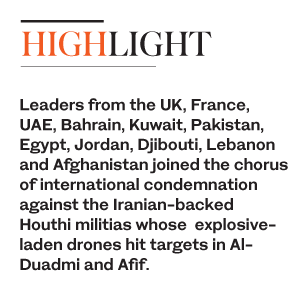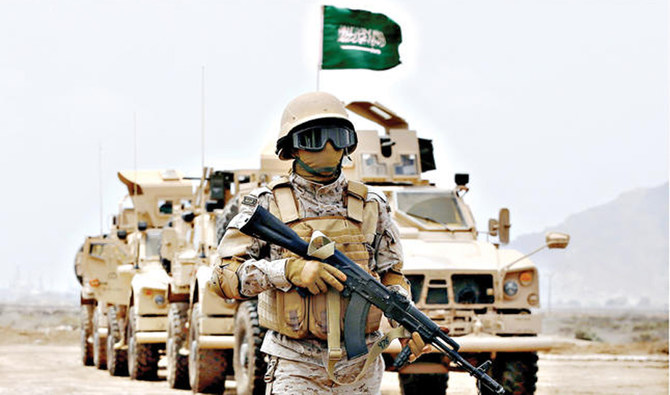JEDDAH: Fighter jets of the Arab coalition to restore legitimacy in Yemen carried out airstrikes on a Houthi camp, killing insurgents and destroying combat vehicles, the Saudi Press Agency reported on Wednesday.
According to “SeptemberNet,” the attacks hit rebel targets in the Abs district west of the city of Hajjah, leaving several Houthi terrorists dead and wounded and wiping out six tanks.
Similar airstrikes targeted sites of Houthi militia at Al-Jar farms in the same Yemeni district, wrecking two vehicles and two platforms used by Houthi rebels to fire Katyusha rockets.
Rallies and gatherings of Houthi militia in central Al-Baidha province were also attacked, this time by Yemeni national army forces, backed by popular resistance. Rockets were reportedly fired on rebel gatherings at the Qashash site, in the Qirba area of Zahir district. The operation destroyed a combat car and killed three Houthis.
 The coalition strikes follow Tuesday’s Houthi drone attacks on two Saudi oil-pumping stations in the desert west of Riyadh.
The coalition strikes follow Tuesday’s Houthi drone attacks on two Saudi oil-pumping stations in the desert west of Riyadh.
World leaders, Arab and Muslim organizations have condemned the attacks on the Kingdom’s east-west oil pipeline and called for a united international effort to combat terror in the region.
The Muslim World League and the Council of Arab Ministers of Interior were among the first to slam the acts of sabotage which they described as not only a threat to Middle East and world security but also the stability of global energy supplies.
Leaders from the UK, France, UAE, Bahrain, Kuwait, Pakistan, Egypt, and Afghanistan joined the chorus of international condemnation against the Iranian-backed Houthi militias whose explosive-laden drones hit targets in Al-Duadmi and Afif. The attacks did not interrupt production or export of Saudi oil.
The Council of Ministers of Yemen, in a statement following its weekly Cabinet meeting under the chairmanship of Dr. Mueen Abdulmalik, in Aden, expressed full solidarity with Saudi Arabia.
British Foreign Secretary Jeremy Hunt said that the attack was not only a wrong act, but would reduce the confidence needed to end the conflict in Yemen.
French Foreign Ministry spokeswoman Agnes Von der Muhll said: “These attacks, which threaten the security of Saudi Arabia and the stability of the region, are unacceptable.”
The UAE Ministry of Foreign Affairs and International Cooperation gave its support to measures being taken by the Kingdom to tackle extremism and terrorism.
The Bahrain Foreign Affairs Ministry said the attacks threatened the safety of world energy supplies and stressed the need for the international community to combat all groups and terrorist organizations, and any parties or states supporting them.
Pakistan reiterated its full support for Saudi Arabia against any threat to the stability and security of the Kingdom.
Libya expressed the solidarity of its people, and the Sudanese Foreign Ministry affirmed its unlimited support for all measures being taken to protect its security and oil supplies, calling on the international community to shoulder its responsibilities for protecting peace and stability in the Gulf and Arab regions.
Jordan, Afghanistan, Djibouti and Lebanon also pledged backing to the Kingdom.
Muslim World League Secretary-General Sheikh Dr. Mohammed bin Abdul Karim Al-Issa said the attacks reflected the level of hatred terrorist organizations felt toward the Kingdom but added that would only increase Saudi Arabia’s determination to confront the “forces of evil.”
The Secretariat General of the Senior Scholars Council said the attacks would make the leadership and people of Saudi Arabia stronger and more determined in the face of terrorism.



























